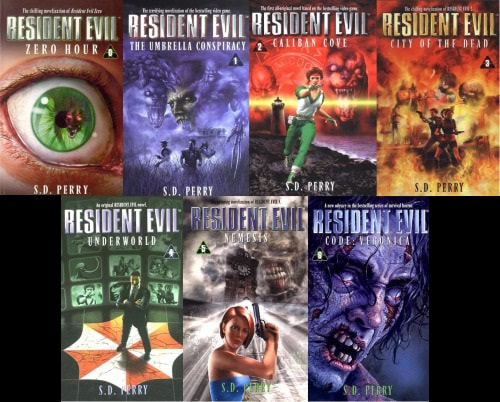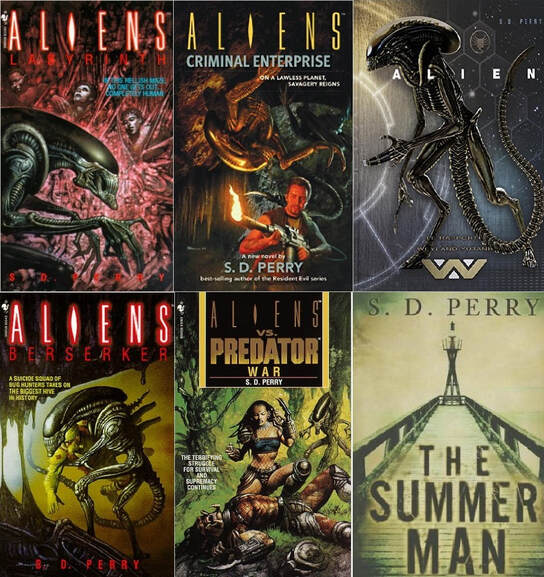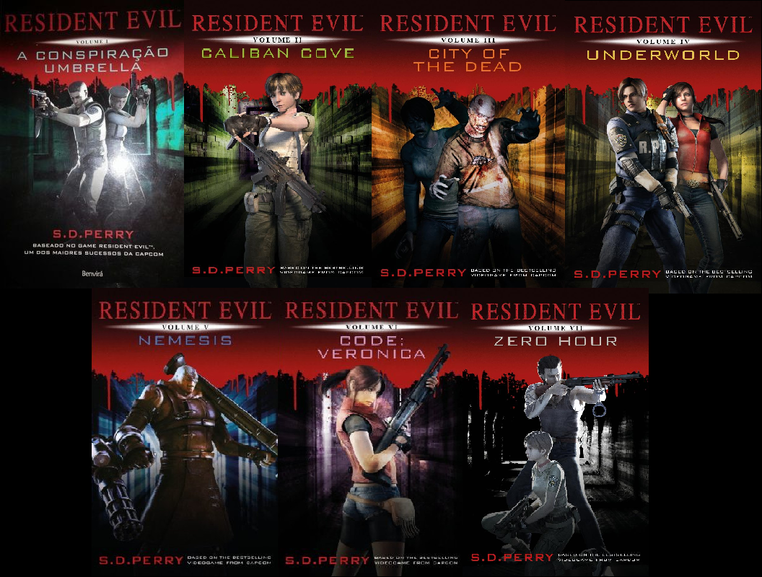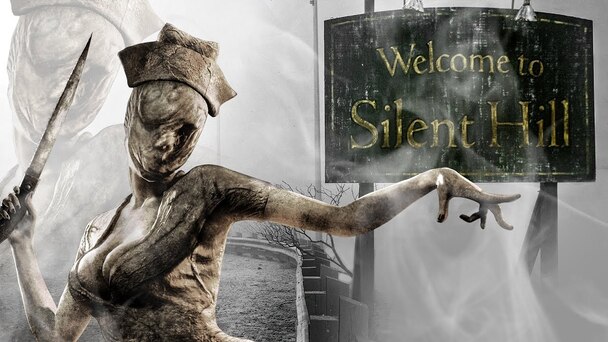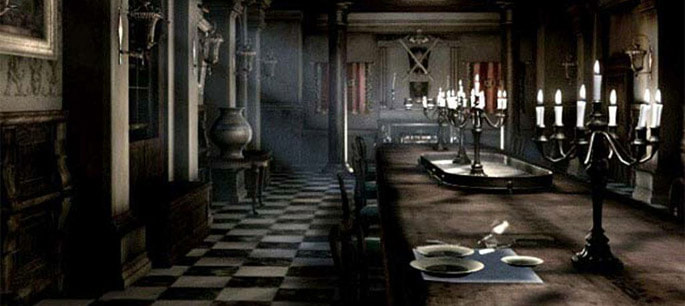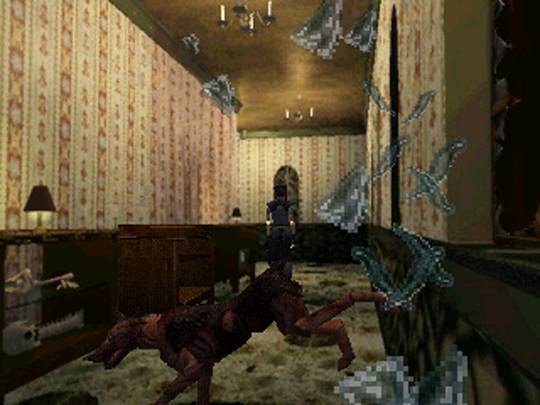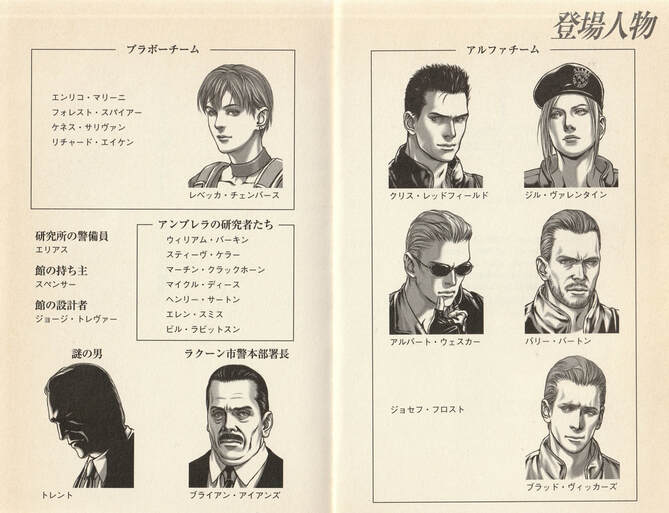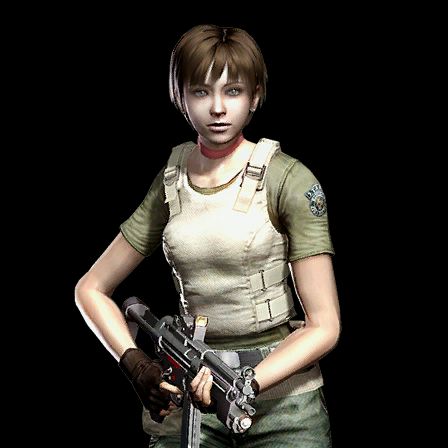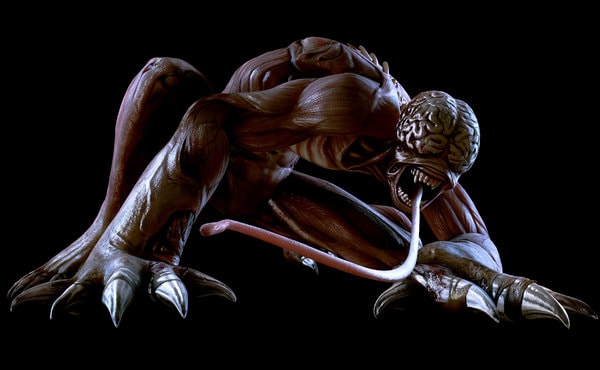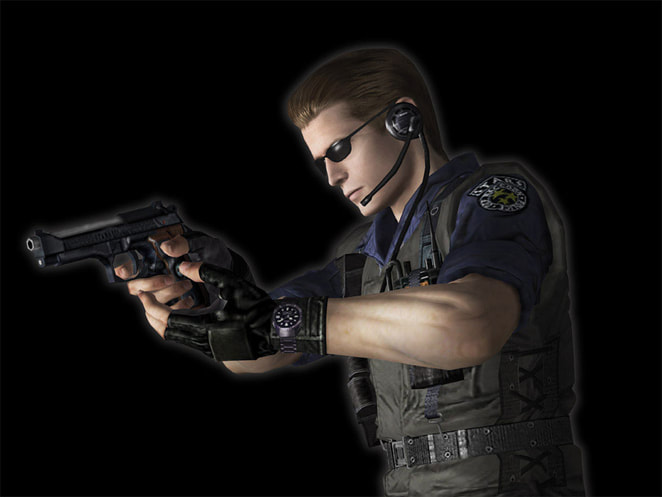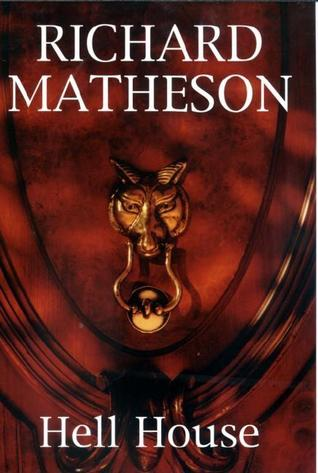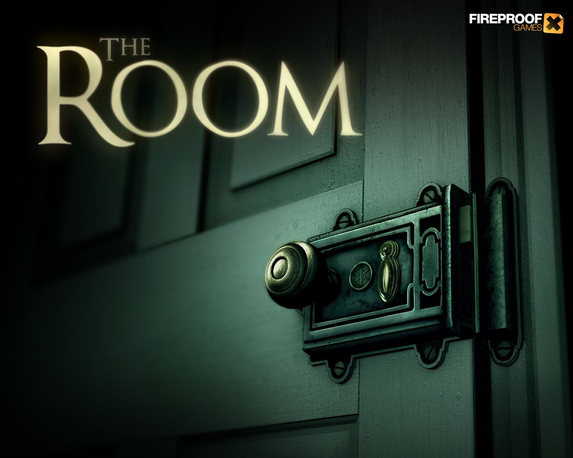Thanks to SD Perry for agreeing to answer our EXTENSIVE list of community questions.
Interview originally published on Crimson-Head.com in 2016.
Interview conducted by BSAArklay.
Interview originally published on Crimson-Head.com in 2016.
Interview conducted by BSAArklay.
Q) I see that there is a 3 year gap between Code Veronica and Zero. Any reason why? Furthermore what made you decide to continue with the novels and also what made you decide to go with Zero?
A) I have mostly done contract work throughout my career, writing tie-ins and novelizations. Someone hires me to write about or for a franchise/shared universe. When Simon and Schuster held the publishing license for RE, they decided when to release the books and which games to have me write about.
Q) Umbrella’s conspiracy revolves around the events that take place during the PlayStation 1’s original Resident Evil. 4 years later Capcom remade the game and added elements such as environments, story, characters and new B.O.W.’s. Did you ever consider rewriting Umbrella Conspiracy? Assuming you have played Resident Evil Remake 2002, do you like the new elements and how do you feel this new version would have changed the way you wrote the book.
A) I haven’t played the remake; sorry!
Q) I can’t help but notice that you have written several books in the horror genre including Resident Evil, Aliens and Summer Man. Is this something that you choose to pressure personally? If yes then what inspired you too write in the horror genre? Do you enjoy horror movies? Did any specific ones inspire you?
A) I’m not just a horror fan, I’m a horror nerd. I read The Shining when I was 10 and fell in love with the genre. I read mostly horror, gothic to modern day, and I love horror movies—from subtle artsy scary to total gore-fest. Even the really bad ones sometimes have a decent creepy moment, and I’ll sit through a lot to get to one of those moments. My all-time favorite horror flick is probably John Carpenter’s The Thing. The effects are pretty dated now, but I first saw it in my teens and it blew my mind. Isolation, paranoia, insanity… I love those themes, in movies and literature.
A) I have mostly done contract work throughout my career, writing tie-ins and novelizations. Someone hires me to write about or for a franchise/shared universe. When Simon and Schuster held the publishing license for RE, they decided when to release the books and which games to have me write about.
Q) Umbrella’s conspiracy revolves around the events that take place during the PlayStation 1’s original Resident Evil. 4 years later Capcom remade the game and added elements such as environments, story, characters and new B.O.W.’s. Did you ever consider rewriting Umbrella Conspiracy? Assuming you have played Resident Evil Remake 2002, do you like the new elements and how do you feel this new version would have changed the way you wrote the book.
A) I haven’t played the remake; sorry!
Q) I can’t help but notice that you have written several books in the horror genre including Resident Evil, Aliens and Summer Man. Is this something that you choose to pressure personally? If yes then what inspired you too write in the horror genre? Do you enjoy horror movies? Did any specific ones inspire you?
A) I’m not just a horror fan, I’m a horror nerd. I read The Shining when I was 10 and fell in love with the genre. I read mostly horror, gothic to modern day, and I love horror movies—from subtle artsy scary to total gore-fest. Even the really bad ones sometimes have a decent creepy moment, and I’ll sit through a lot to get to one of those moments. My all-time favorite horror flick is probably John Carpenter’s The Thing. The effects are pretty dated now, but I first saw it in my teens and it blew my mind. Isolation, paranoia, insanity… I love those themes, in movies and literature.
Q) What was the process for creating the covers for the original books? Umbrella Conspiracy is without a doubt my favourite cover. It breathes atmosphere and everything I love about Resident Evil. Who helped you create the covers and how much input did you have?
A) My editor for RE, Marco Palmieri, oversaw the CG covers. He was a fan of the first game—the only one out when I was hired to write the first books—and novelizing the games were his idea. I wrote the books, but he was the mastermind behind the whole thing. I liked the covers, too, but had no input.
Q) What is your favourite cover art for these novels?
A) Hmm. I don’t know that I have a favourite. The first one was pretty good…
Q) Is there any particular reason for the new covers?
Yes, but to explain it will take a super brief lesson on the work that I did for RE, and the nature of contract work in general. A publishing company sees something they’d like to put out a book on—a game, a TV show, whatever—and basically leases the rights to that product/idea for a brief period, for one or more projects. That company then hires a writer to make their project or projects happen. Usually someone who has already worked in shared universes, and can write quickly, without too much editing. The contract that the writer signs is usually for a flat fee—little or no royalties—and the writer doesn’t get any rights to the material; they’re selling their writing skills, period, and once the project is over, they have no say in what happens to what they’ve written, because someone else owns it.
A few years ago, Titan books did a deal with Capcom—I’m assuming—and re-released the books with new covers. I had no idea they were even out until a guy on my FB feed mentioned it. It was cool to point them out to my kids in the grocery store—“Mommy wrote this!”—but I had nothing to do with it. No money, no input, no notification.
A) My editor for RE, Marco Palmieri, oversaw the CG covers. He was a fan of the first game—the only one out when I was hired to write the first books—and novelizing the games were his idea. I wrote the books, but he was the mastermind behind the whole thing. I liked the covers, too, but had no input.
Q) What is your favourite cover art for these novels?
A) Hmm. I don’t know that I have a favourite. The first one was pretty good…
Q) Is there any particular reason for the new covers?
Yes, but to explain it will take a super brief lesson on the work that I did for RE, and the nature of contract work in general. A publishing company sees something they’d like to put out a book on—a game, a TV show, whatever—and basically leases the rights to that product/idea for a brief period, for one or more projects. That company then hires a writer to make their project or projects happen. Usually someone who has already worked in shared universes, and can write quickly, without too much editing. The contract that the writer signs is usually for a flat fee—little or no royalties—and the writer doesn’t get any rights to the material; they’re selling their writing skills, period, and once the project is over, they have no say in what happens to what they’ve written, because someone else owns it.
A few years ago, Titan books did a deal with Capcom—I’m assuming—and re-released the books with new covers. I had no idea they were even out until a guy on my FB feed mentioned it. It was cool to point them out to my kids in the grocery store—“Mommy wrote this!”—but I had nothing to do with it. No money, no input, no notification.
Q) I can’t help but notice that City of the Dead is you’re longest book and by a significant number of pages (Usually around 100 pages longer). Was this because of the fact that it follows both Claire and Leon? Did this make a more difficult book for you to write?
A) Yes and Yes!
A) Yes and Yes!
Q) When reading Nemesis I couldn’t help but notice that Nicholai comes across as a very intense and cruel character. He is much more sinister than in the games especially in terms of dialogue. Did you get the feeling from the games that his character should play out more this way? Or is there another reason for this?
A) No particular reason. I like my bad guys really bad, I guess. Truthfully, I barely remember most of the characters past the first couple of games. I was a fan, but not a mega-fan, and I was on tight deadlines, and I wrote the books 15-20 years ago; the games and the books sort of blended together after a while.
Q) Capcom are not really known for including romance into their projects. Did you feel like whilst you were writing the novels that you would like to possibly go down the romance route with any particular characters?
A) When I write, I imagine all kinds of stuff, but my editor gave me pretty clear instructions for these books—try for the feel of the game, lots of zombie-killing action, and minimal use of the F-word. We never talked seriously about putting in any romance past what was in the games.
Q) Where there are characters that you can recall that survived who you wished hadn’t or thought would have helped the story if they had died. Then where there any characters who you knew had to die but you enjoyed writing about them so much you wish you didn’t have to kill off.
A) Yes, though I totally can’t remember many of the character names. Like I said, long time ago. I seem to remember being bummed when Steve Burnside died in the book, but it was still fun to write about; I loved watching him die in the game.
Q) Have you seen any particular game that you thought ‘I would love to write a novel about this one’?
A) Games in general? Sure. Silent Hill. I think it’s been done by somebody else, though.
A) No particular reason. I like my bad guys really bad, I guess. Truthfully, I barely remember most of the characters past the first couple of games. I was a fan, but not a mega-fan, and I was on tight deadlines, and I wrote the books 15-20 years ago; the games and the books sort of blended together after a while.
Q) Capcom are not really known for including romance into their projects. Did you feel like whilst you were writing the novels that you would like to possibly go down the romance route with any particular characters?
A) When I write, I imagine all kinds of stuff, but my editor gave me pretty clear instructions for these books—try for the feel of the game, lots of zombie-killing action, and minimal use of the F-word. We never talked seriously about putting in any romance past what was in the games.
Q) Where there are characters that you can recall that survived who you wished hadn’t or thought would have helped the story if they had died. Then where there any characters who you knew had to die but you enjoyed writing about them so much you wish you didn’t have to kill off.
A) Yes, though I totally can’t remember many of the character names. Like I said, long time ago. I seem to remember being bummed when Steve Burnside died in the book, but it was still fun to write about; I loved watching him die in the game.
Q) Have you seen any particular game that you thought ‘I would love to write a novel about this one’?
A) Games in general? Sure. Silent Hill. I think it’s been done by somebody else, though.
Q) Where you aware that Capcom have taken some elements from your books? Such as Barry’s wife being named Kathy was first used in your novels. As well as Chris and Claire’s parents dying in a car crash which was introduced into the games in 2015 in a game called Revelations 2. How does it make you feel that books you have written over a decade again are still influencing a company as large as Capcom to use your material to help tell their story?
A) Nope, I had no idea. How does it feel? Er… good? It’s weird. You have to understand, I had no idea that these books would be particularly popular. I wrote each one in about a month, up all night, jacked on nicotine and grape soda. I was a newbie writer and made newbie writer mistakes. I’ll never fully live down that I didn’t know my weapons very well, or the difference between a clip and a magazine. I’m slightly shocked that anyone even remembers them, let alone considers them inspirational. Or canonical.
Questions by OracleDragon
Q) How did Capcom get a hold of you to commission these stories? Or did you contact them?
A) I had no direct contact with Capcom. My only contact was my editor at S&S, Marco Palmieri. He was looking for a contract writer to do these books, and got hold of my father, Steve Perry—my dad’s a very good and well-respected write-for-hire guy—but my dad was busy, so he gave Marco my name. I’d already had a few tie-ins and a movie novelization published, and was a fan of the game; Marco read one of my Aliens books and then offered me the contract.
Q) Did they provide you much information to go by or did they say to you to fill in some gaps?
A) When I did the outline for the first book, my editor asked me to put in some sinister history for the mansion—like, who built it, and why it was so mysterious. He also came up with the stuff about Jill being an ex-burglar. Capcom read the outline and told Marco that they already had a history for the house, and to leave it out. When the second game came out, they sent me some images of the characters. I think I got a few more character drawings for two of the other games. That was all of the input I got from Capcom, ever.
A) Nope, I had no idea. How does it feel? Er… good? It’s weird. You have to understand, I had no idea that these books would be particularly popular. I wrote each one in about a month, up all night, jacked on nicotine and grape soda. I was a newbie writer and made newbie writer mistakes. I’ll never fully live down that I didn’t know my weapons very well, or the difference between a clip and a magazine. I’m slightly shocked that anyone even remembers them, let alone considers them inspirational. Or canonical.
Questions by OracleDragon
Q) How did Capcom get a hold of you to commission these stories? Or did you contact them?
A) I had no direct contact with Capcom. My only contact was my editor at S&S, Marco Palmieri. He was looking for a contract writer to do these books, and got hold of my father, Steve Perry—my dad’s a very good and well-respected write-for-hire guy—but my dad was busy, so he gave Marco my name. I’d already had a few tie-ins and a movie novelization published, and was a fan of the game; Marco read one of my Aliens books and then offered me the contract.
Q) Did they provide you much information to go by or did they say to you to fill in some gaps?
A) When I did the outline for the first book, my editor asked me to put in some sinister history for the mansion—like, who built it, and why it was so mysterious. He also came up with the stuff about Jill being an ex-burglar. Capcom read the outline and told Marco that they already had a history for the house, and to leave it out. When the second game came out, they sent me some images of the characters. I think I got a few more character drawings for two of the other games. That was all of the input I got from Capcom, ever.
Q) Did you expect the fans to be excited about these books? (I was when I was young finding out about them, took one to school to read.)
A) I had no real expectations. I hoped they would do well, but had no idea if the fans would like them.
Q) What was your inspiration that kept you writing the books? Like, when you had writers block, what did you do to get past it?
A) I’m sure this will sound crass, but I was hired to write these, and had specific deadlines to meet. In contract work, you get paid some money up front, and more when you turn in the project. I had writer’s block a number of times, but at the end of the day, I couldn’t afford to blow deadlines. There were bills to pay. Sometimes that meant just sitting down and forcing myself to get into the story.
Q) Are you still contact with Capcom to this day?
A) No. Never was. My editor gave me the impression that Capcom didn’t really like the books, but I never heard why.
A) I had no real expectations. I hoped they would do well, but had no idea if the fans would like them.
Q) What was your inspiration that kept you writing the books? Like, when you had writers block, what did you do to get past it?
A) I’m sure this will sound crass, but I was hired to write these, and had specific deadlines to meet. In contract work, you get paid some money up front, and more when you turn in the project. I had writer’s block a number of times, but at the end of the day, I couldn’t afford to blow deadlines. There were bills to pay. Sometimes that meant just sitting down and forcing myself to get into the story.
Q) Are you still contact with Capcom to this day?
A) No. Never was. My editor gave me the impression that Capcom didn’t really like the books, but I never heard why.
Questions by USSCommand
Q) Do you think you Resident Evil is headed in the right direction?
A) I actually don’t know. I rarely have time to play anything anymore… I write contract stuff and my own books and work at my kids’ school as a lunch lady and other life things. The time investment that one of these big games takes is totally beyond my scope these days.
Q) Are you still a fan of the series?
A) I’m a fan of the games I played… but I haven’t played in a long time. Just recently, I plugged in the first game and was shocked to learn that my reflexes suck these days. I died in the dog hallway, like ten minutes in. Embarrassing, considering I used to be able to run through the game in under two hours.
Q) Are you aware that the translations of your books are not very accurate?
A) I wasn’t aware.
Q) It has been said you had received exclusive Japanese material from Capcom to help write the novels, would you happen to still have it? How much of it did you use? Anything you didn't use?
A) I just got some character images, and an article about the game’s creator; nothing else.
Q) Do you like the covers of the reprints of your books?
A) Sure. I’ve only seen them online—well, a couple at the grocery store—and they looked nice.
Q) What would Trent’s views be on the current state of a world of Bioterrorism (The later games in the series)?
A) I haven’t seen the later games, but Trent would always be looking for a way to manipulate things to his advantage, losing battles to win wars.
Q) You're book has been noted for plot holes and errors, due to lack of knowledge of the direction the story was going to take, if you could, would you rewrite them to coincide with the later games and new information.
A) I have no doubt there are lots of plot holes and errors. In the later books, I put in a kind of disclaimer, explaining that mistakes were inevitable, considering the game makers/movie people/writers weren’t in contact. I got no direction from Capcom and wasn’t consulted or warned about anything I was writing, whether or not it would contradict what they were up to. At the time, I remember being frustrated when a new game would come out, blowing holes in the stories I had already written—but rewrites weren’t being suggested or offered. Since RE is licensed material, someone would have to hire me to rewrite them before I could touch anything.
Q) Are you aware that the Japanese versions of your novels have illustrations of the characters in them? What's your opinion on them?
A) Sorry, wasn’t aware; no opinion.
A) I wasn’t aware.
Q) It has been said you had received exclusive Japanese material from Capcom to help write the novels, would you happen to still have it? How much of it did you use? Anything you didn't use?
A) I just got some character images, and an article about the game’s creator; nothing else.
Q) Do you like the covers of the reprints of your books?
A) Sure. I’ve only seen them online—well, a couple at the grocery store—and they looked nice.
Q) What would Trent’s views be on the current state of a world of Bioterrorism (The later games in the series)?
A) I haven’t seen the later games, but Trent would always be looking for a way to manipulate things to his advantage, losing battles to win wars.
Q) You're book has been noted for plot holes and errors, due to lack of knowledge of the direction the story was going to take, if you could, would you rewrite them to coincide with the later games and new information.
A) I have no doubt there are lots of plot holes and errors. In the later books, I put in a kind of disclaimer, explaining that mistakes were inevitable, considering the game makers/movie people/writers weren’t in contact. I got no direction from Capcom and wasn’t consulted or warned about anything I was writing, whether or not it would contradict what they were up to. At the time, I remember being frustrated when a new game would come out, blowing holes in the stories I had already written—but rewrites weren’t being suggested or offered. Since RE is licensed material, someone would have to hire me to rewrite them before I could touch anything.
Q) Are you aware that the Japanese versions of your novels have illustrations of the characters in them? What's your opinion on them?
A) Sorry, wasn’t aware; no opinion.
Q) Would you be interested in writing more RE novels? Be it a standalone story or a novelization.
A) Absolutely. They were fun to write.
Q) Who was your favourite character to explore?
A) Hmm. Probably Rebecca. I also liked Ada Wong. And Carlos. And all of the villains.
A) Absolutely. They were fun to write.
Q) Who was your favourite character to explore?
A) Hmm. Probably Rebecca. I also liked Ada Wong. And Carlos. And all of the villains.
Q) Out of the characters YOU created who was your favourite?
A) Jeez. I don’t remember… Karen, from Caliban Cove, maybe. Because she ate someone’s face.
Q) Did you have ideas for future Resident Evil novels that never saw the light of day? If so can you give us the details?
A) Honestly, I don’t think I can even mention any ideas, without infringing on Capcom’s property rights. Sorry!
Q) Was anything ever cut from the books? (Characters, ideas, bows)
A) My editor cut some of my language; I have a foul mouth.
Q) What is your favourite B.O.W. (Bio Organic Weapon)?
A) Hmm. The licker, from the second game. Dug that crazy tongue.
A) Jeez. I don’t remember… Karen, from Caliban Cove, maybe. Because she ate someone’s face.
Q) Did you have ideas for future Resident Evil novels that never saw the light of day? If so can you give us the details?
A) Honestly, I don’t think I can even mention any ideas, without infringing on Capcom’s property rights. Sorry!
Q) Was anything ever cut from the books? (Characters, ideas, bows)
A) My editor cut some of my language; I have a foul mouth.
Q) What is your favourite B.O.W. (Bio Organic Weapon)?
A) Hmm. The licker, from the second game. Dug that crazy tongue.
Q) Holden was Wesker's contact in Umbrella. He is mentioned in the Marvel comic, Wildstorm comics, and the unused Romero Script. Where you given any information on this character from Capcom? Or even knew of his existence?
A) Didn’t know.
Q) Also what was the reasoning of placing Raccoon City in Pennsylvania?
A) I don’t actually remember. I think it was my editor’s idea, but he might have gotten it from Capcom.
A) Didn’t know.
Q) Also what was the reasoning of placing Raccoon City in Pennsylvania?
A) I don’t actually remember. I think it was my editor’s idea, but he might have gotten it from Capcom.
Questions by AVPRYU
Q) In the first book, you made reference to the Japanese novel The True Story Behind BIO HAZARD. Was it you’re choice or did Capcom ask you to?
A) My editor must have asked me to put it in. I tried not to reference stuff I didn’t know about.
Q) Have you ever had the opportunity to read the rejected screenplay George Romero wrote for the movie Resident Evil?
A) No. I heard he might be getting involved, and was totally psyched to think he might have read one of my books—the Living Dead movies (Night, Dawn, Day) are classics—but I had no personal connection to the movies, in any way. I’d like to read it, though, I’m a fan.
Q) What do you think of the fact that the director of the RE movies, Paul Anderson, stated that the novels are not faithful. How ironic that his films do not follow any history of the game, which is why fans hate the movies. But he used elements of the original novels. Such as: armed and intelligent zombies (Caliban cove) laboratories and test areas for BOW (Underworld). How do you feel about this?
A) Huh. I didn’t know he’d ever looked at the books. I don’t really have an opinion, I guess. Nowadays, there’s a lot more coordination in shared universes, but canon used to not be such a big deal, particularly for a new property.
Q) Finally as fan of aliens, do you have plans to do a sequel to the book Aliens: Labyrinth? Or even another book of Aliens ?
A) Last year, I wrote the text for a book called The Weyland-Yutani Report, that came out in a limited collector’s edition, from Insight Editions. I think they’ll do a general release in the next year or so, I don’t actually know, but it was cool to play around in the Aliens universe again. Like I may have mentioned earlier, contract writers have to be hired by the property/license owner, and it’s an invitation-only kind of situation.
Questions by SkinniMini
Q) First off, why did you focus a great deal of attention on Rebecca in your novels (especially in your original novels)? Was it because Capcom asked you to do specifically? If they did, what was the reason for that? Or maybe it was it due to your own personal interest in the character? Was she your favourite character in the series during that time? Or was it because you felt she had potential as a character and wanted to develop her further than the games were doing at that point?
A) The first contract was for four books, two based on the first two games, two original. My editor suggested that I pick a minor character from the first game to write about in the first original book, which was set to come out before the second game was even released. I picked Rebecca because she wasn’t a major character, and she didn’t die in the first game. I had no idea she would eventually become a major character for Capcom.
Q) If you were given the opportunity to write a new original (and possibly canon) storyline for one of the newer characters be it dead or alive (characters such as Adult Sherry, Jake, Piers, Jessica, Raymond, Moira, Natalia, Alex, Sheva for example), who would it be and why? If you haven’t been following the series recently are there any old characters you wanted to explore further?
A) I’m sorry, I haven’t followed the series. Wesker would be fun, wouldn’t he?
Q) Have you seen the CGI movies, Degeneration and Damnation? If so, what did you think of them? Would you have liked to see one of your original novels in film format?
A) I saw part of the first theatrical movie, once; other than that, I haven’t seen any of the adaptations/films. I believe I only wrote two original ones, Caliban Cove and Underworld… would I see a movie based on one of them? I don’t know. I’m kind of a weird person, I write books and send them out and don’t usually think about them again, or read them, or watch the movies. I’m a fan of writing more than I am what I’m writing about, if that makes sense. I mean, I get into whatever I’m working on, but that’s part of my job—embracing what the fans dig, to “get” it the way that they do. It’s like I’m hired to be a professional fan, and write what I like about a property. Even the really cool stuff, I tend to set it aside once I’m done with a project because I have something else I have to get interested in, professionally.
A) I saw part of the first theatrical movie, once; other than that, I haven’t seen any of the adaptations/films. I believe I only wrote two original ones, Caliban Cove and Underworld… would I see a movie based on one of them? I don’t know. I’m kind of a weird person, I write books and send them out and don’t usually think about them again, or read them, or watch the movies. I’m a fan of writing more than I am what I’m writing about, if that makes sense. I mean, I get into whatever I’m working on, but that’s part of my job—embracing what the fans dig, to “get” it the way that they do. It’s like I’m hired to be a professional fan, and write what I like about a property. Even the really cool stuff, I tend to set it aside once I’m done with a project because I have something else I have to get interested in, professionally.
Questions by BloodyEye
Q) Which book in the series did you enjoy writing the most?
A) Probably the second game adaptation, City of the Dead. I’d already written a couple of books so I wasn’t afraid of the process anymore, and I loved that game. I also liked Nemesis, for the pursuer/Mr. X.
Q) Which book proved to be the most challenging creatively?
A) Umbrella Conspiracy. Because there weren’t a lot of game adaptations out, and I hadn’t read any, so I was pretty much guessing how to turn a game into a book. I played the first RE about a billion times, trying to get the feel of the game and memorize all of the elements, but I was, like, 20-something. I just kind of… made the format up.
Questions by Alan Wenpei Mao
Q) Has Capcom asked if you could write more novels based on the recent games?
A) Nope.
Q) Have you seen any of the Resident Evil movies? Did you enjoy them and which ones are your favourites?
A) I haven’t, sorry, except for part of the first one. I liked the lasers-in-the-hall trap, but that’s all I actually remember.
Q) Did Capcom restrict you from covering anything in your novel or did you have a lot of control?
A) Capcom only told me not to write about the history of the mansion, in the first novelization. Other than that, decisions were made by my editor or by me.
Question by JamesMarcus
Q) (Resident Evil, Star Trek and Aliens) What is your preferred universe to write for and why?
A) Interesting question, but one that I can’t really answer. When I’m actively working in a universe, that’s my favorite universe. I’ve liked working in all of them.
Questions by Morpheus Duvall
Q) What do you think about the canon issue?
A) I don’t know that I’m qualified to address the issue. My editor pretty much said, “just make it fun”, and that’s what I tried to do. When I was hired only the first game was out, so I stuck to the game as much as I could, but canon wasn’t a thing. I guess I wish that Capcom had given me some direction, so I could have adjusted accordingly, but they were a giant company and I was just a write-for-hire doing a few books for an American publisher; I doubt I was on their radar at all. Now, people occasionally find it necessary to point out that I contradicted myself, the games, etc., but it was kind of unavoidable at the time. If people enjoyed the books, that’s cool, and if the lack of continuity made them hate the books, that’s cool, too. To each his or her own.
Q) Was you intimidated when you first undertook to write in the RE universe?
A) Yup. I’d done a couple of graphic novel adaptations, and one movie script, but I was still a noob. I loved the first game—I was only about halfway through when I was contacted about writing the books—and tried to do it justice, but I really didn’t know what I was doing.
Q) Do you feel that some negative feedback in this debate have been silenced by the recent inclusion into the canon of two of your own book inventions.
A) I know there’s a debate, but I’m not involved in it. I may have mentioned, I’m kind of weird… I have social anxiety issues, among others, so I try to avoid reading reviews. I’ll see ten nice ones, then one that says I suck, and that one review will stick in my brain and keep me up nights. I know some people don’t like the books, but there’s no way that any writer is going to make all of the fans happy, all of the time, so I just kind of stay out of it. I do my thing and try not to get into debates over stuff I can’t control.
Question by Nemesis
Q) Was it more enjoyable to write an original story that you had more creative freedom with?
A) Yes and no. It was a little harder, because I didn’t have a clear blueprint, but I also got to come up with environments and new characters and monsters, which was cool.
Questions by Vito
Q) Did you ask Capcom if Nicholai died in the game?
A) No. They got copied on all of my outlines and first drafts, and didn’t offer direction about anything.
Q) What was the end game plan for Trent? Would he have brought down Umbrella?
A) Trent was my editor’s idea. He wanted a mysterious character with unknown motivations to stir things up a little, and be a common thread throughout the novelizations. Would he have brought down Umbrella? I think yes, but there was no ultimate end game when I put him in.
Questions by Yoke
Q) What is your favourite book to read?
A) I re-read Hell House by Richard Matheson every Christmas. I’ve read several Stephen King books more than once, and most of Lovecraft multiple times. I just like to read, and horror is my favorite.
Q) Was it more enjoyable to write an original story that you had more creative freedom with?
A) Yes and no. It was a little harder, because I didn’t have a clear blueprint, but I also got to come up with environments and new characters and monsters, which was cool.
Questions by Vito
Q) Did you ask Capcom if Nicholai died in the game?
A) No. They got copied on all of my outlines and first drafts, and didn’t offer direction about anything.
Q) What was the end game plan for Trent? Would he have brought down Umbrella?
A) Trent was my editor’s idea. He wanted a mysterious character with unknown motivations to stir things up a little, and be a common thread throughout the novelizations. Would he have brought down Umbrella? I think yes, but there was no ultimate end game when I put him in.
Questions by Yoke
Q) What is your favourite book to read?
A) I re-read Hell House by Richard Matheson every Christmas. I’ve read several Stephen King books more than once, and most of Lovecraft multiple times. I just like to read, and horror is my favorite.
Q) What made you want to become a writer?
A) I don’t really have any other marketable skills. Also, my dad is a writer, so I knew it was a real job that was really within reach, at an early age. I started writing stories and journals and stuff as a tween, and always got positive feedback from my parents. For a while I wanted to be a poet, and my father kindly pointed out that making a living as a poet would be super difficult. Most writers aren’t wealthy, and have day jobs, by the way… but I just love to write, it makes me feel good about myself, so I keep doing it.
Q) How do you relax after a hard day of writing?
A) I have a part-time day job during the week that requires I get up early (well, early for me—0730), so I usually do that and then go home and nap. I get up after a few hours, hang with the fam (married for 20 years this Halloween to an awesome dude, with two excellent boys, aged 11 and 13), make dinner, do my relaxing things. Then I write, and am usually up into the small hours. Weekends I sleep in and try to catch up on chores. I don’t write every day, though, sometimes just a few times a week. Depends on if I have a deadline, and how soon it is. To relax, I read a lot, and can kill a book in a day or so. I watch movies with my husband, or binge-watch seasons of things on my Kindle (I just watched all of Hannibal last week and totally, guiltily enjoyed it), or play simple video games, usually puzzles (Quell, The Room, that kind of thing). I ingest relaxing substances occasionally, which is legal in my state. About every other week, I go out with a girlfriend for cocktails. Basic old lady type stuff, but I don’t garden and am generally anti-social/deeply introverted.
A) I don’t really have any other marketable skills. Also, my dad is a writer, so I knew it was a real job that was really within reach, at an early age. I started writing stories and journals and stuff as a tween, and always got positive feedback from my parents. For a while I wanted to be a poet, and my father kindly pointed out that making a living as a poet would be super difficult. Most writers aren’t wealthy, and have day jobs, by the way… but I just love to write, it makes me feel good about myself, so I keep doing it.
Q) How do you relax after a hard day of writing?
A) I have a part-time day job during the week that requires I get up early (well, early for me—0730), so I usually do that and then go home and nap. I get up after a few hours, hang with the fam (married for 20 years this Halloween to an awesome dude, with two excellent boys, aged 11 and 13), make dinner, do my relaxing things. Then I write, and am usually up into the small hours. Weekends I sleep in and try to catch up on chores. I don’t write every day, though, sometimes just a few times a week. Depends on if I have a deadline, and how soon it is. To relax, I read a lot, and can kill a book in a day or so. I watch movies with my husband, or binge-watch seasons of things on my Kindle (I just watched all of Hannibal last week and totally, guiltily enjoyed it), or play simple video games, usually puzzles (Quell, The Room, that kind of thing). I ingest relaxing substances occasionally, which is legal in my state. About every other week, I go out with a girlfriend for cocktails. Basic old lady type stuff, but I don’t garden and am generally anti-social/deeply introverted.
Questions by Wonderman
Q) What made you want to become a writer?
A) I don’t really have any other marketable skills. Also, my dad is a writer, so I knew it was a real job that was really within reach, at an early age. I started writing stories and journals and stuff as a tween, and always got positive feedback from my parents. For a while I wanted to be a poet, and my father kindly pointed out that making a living as a poet would be super difficult. Most writers aren’t wealthy, and have day jobs, by the way… but I just love to write, it makes me feel good about myself, so I keep doing it.
Q) How do you relax after a hard day of writing?
A) I have a part-time day job during the week that requires I get up early (well, early for me—0730), so I usually do that and then go home and nap. I get up after a few hours, hang with the fam (married for 20 years this Halloween to an awesome dude, with two excellent boys, aged 11 and 13), make dinner, do my relaxing things. Then I write, and am usually up into the small hours. Weekends I sleep in and try to catch up on chores. I don’t write every day, though, sometimes just a few times a week. Depends on if I have a deadline, and how soon it is. To relax, I read a lot, and can kill a book in a day or so. I watch movies with my husband, or binge-watch seasons of things on my Kindle (I just watched all of Hannibal last week and totally, guiltily enjoyed it), or play simple video games, usually puzzles (Quell, The Room, that kind of thing). I ingest relaxing substances occasionally, which is legal in my state. About every other week, I go out with a girlfriend for cocktails. Basic old lady type stuff, but I don’t garden and am generally anti-social/deeply
Q) You’ve adapted movies into novels as well. Are there any differences between adapting a movie and adapting a game to the novel format?
A) In general, I don’t know—the only games I’ve novelized were RE—but for me, it was very different. The movie novelizations were actually written from scripts. Basically, you take 120 pages of screenplay and try to turn it into 300 pages of book. I didn’t have a script for any of the games, I just played a lot. After the first two, I also used the game guides.
Q) The thing most fans of the novels love is how you fleshed out the characters, especially minor ones like Joseph Frost, Forest Speyer and Kenneth J. Sullivan who never had a lot of screen time as living beings in the original games. Do you recall how and why you decided to portray some of them like you did? For example you portrayed Joseph Frost as the team wise ass who always picked on Brad Vickers for his cowardice.
A) Thanks! But I don’t recall, I’m sorry. I made stuff up because I had to say something about them, because books need characters that seem real.
Q) One of the most frustrating things about the novels is the continuity errors from one novel to the next in the game based books. The continuity errors seemed to get worse as the series progressed. Do you blame Capcom for not giving you the final draft of their finished game scripts to work from for these errors?
A) I mentioned earlier, the continuity errors were pretty much beyond my control. I only ever got feedback once from Capcom, for one aspect of my first outline—history for the mansion. My editor dealt with them directly, but I never met or corresponded with anyone from the company. Do I blame them? No. I mean, if they’d told me what the games were going to be about, I would have changed stuff, but again, they were a big company and I don’t think anyone thought the books would be so popular. I don’t blame them for not being more interested in what was, to them, probably not a big deal.
Q) In my opinion you write villains especially well and as heinous as their actions are you manage to make them likeable. Do you have a particular favourite villain from the series?
A) Thank you. I like writing for villains. I like humanizing them, and I’m interested in how people can compartmentalize things, to make themselves NOT the villain in any given situation. I remember liking Birkin in the second game, and of course, Wesker was pretty classic.
introverted.
Q) What made you want to become a writer?
A) I don’t really have any other marketable skills. Also, my dad is a writer, so I knew it was a real job that was really within reach, at an early age. I started writing stories and journals and stuff as a tween, and always got positive feedback from my parents. For a while I wanted to be a poet, and my father kindly pointed out that making a living as a poet would be super difficult. Most writers aren’t wealthy, and have day jobs, by the way… but I just love to write, it makes me feel good about myself, so I keep doing it.
Q) How do you relax after a hard day of writing?
A) I have a part-time day job during the week that requires I get up early (well, early for me—0730), so I usually do that and then go home and nap. I get up after a few hours, hang with the fam (married for 20 years this Halloween to an awesome dude, with two excellent boys, aged 11 and 13), make dinner, do my relaxing things. Then I write, and am usually up into the small hours. Weekends I sleep in and try to catch up on chores. I don’t write every day, though, sometimes just a few times a week. Depends on if I have a deadline, and how soon it is. To relax, I read a lot, and can kill a book in a day or so. I watch movies with my husband, or binge-watch seasons of things on my Kindle (I just watched all of Hannibal last week and totally, guiltily enjoyed it), or play simple video games, usually puzzles (Quell, The Room, that kind of thing). I ingest relaxing substances occasionally, which is legal in my state. About every other week, I go out with a girlfriend for cocktails. Basic old lady type stuff, but I don’t garden and am generally anti-social/deeply
Q) You’ve adapted movies into novels as well. Are there any differences between adapting a movie and adapting a game to the novel format?
A) In general, I don’t know—the only games I’ve novelized were RE—but for me, it was very different. The movie novelizations were actually written from scripts. Basically, you take 120 pages of screenplay and try to turn it into 300 pages of book. I didn’t have a script for any of the games, I just played a lot. After the first two, I also used the game guides.
Q) The thing most fans of the novels love is how you fleshed out the characters, especially minor ones like Joseph Frost, Forest Speyer and Kenneth J. Sullivan who never had a lot of screen time as living beings in the original games. Do you recall how and why you decided to portray some of them like you did? For example you portrayed Joseph Frost as the team wise ass who always picked on Brad Vickers for his cowardice.
A) Thanks! But I don’t recall, I’m sorry. I made stuff up because I had to say something about them, because books need characters that seem real.
Q) One of the most frustrating things about the novels is the continuity errors from one novel to the next in the game based books. The continuity errors seemed to get worse as the series progressed. Do you blame Capcom for not giving you the final draft of their finished game scripts to work from for these errors?
A) I mentioned earlier, the continuity errors were pretty much beyond my control. I only ever got feedback once from Capcom, for one aspect of my first outline—history for the mansion. My editor dealt with them directly, but I never met or corresponded with anyone from the company. Do I blame them? No. I mean, if they’d told me what the games were going to be about, I would have changed stuff, but again, they were a big company and I don’t think anyone thought the books would be so popular. I don’t blame them for not being more interested in what was, to them, probably not a big deal.
Q) In my opinion you write villains especially well and as heinous as their actions are you manage to make them likeable. Do you have a particular favourite villain from the series?
A) Thank you. I like writing for villains. I like humanizing them, and I’m interested in how people can compartmentalize things, to make themselves NOT the villain in any given situation. I remember liking Birkin in the second game, and of course, Wesker was pretty classic.
introverted.
Question by Katie
Q) Where did that infamous Wesker moment come from? "I've got a hard-on like you wouldn't believe"? That's caused so much controversy in the fandom, where did that come from when you was writing the story?
A) I had no idea there was controversy. I made it up, because I thought it would make him seem more bad-ass.
Q) Where did that infamous Wesker moment come from? "I've got a hard-on like you wouldn't believe"? That's caused so much controversy in the fandom, where did that come from when you was writing the story?
A) I had no idea there was controversy. I made it up, because I thought it would make him seem more bad-ass.
Questions from Facebook users
Q) How did it feel to write the story about such a popular franchise? Or in other words, how did it feel to bring life through words on a page to something that people used to seeing visually?
A) RE was popular, but remember, only the first game had come out when I was initially hired. I was young and didn’t yet recognize the limits of my writing abilities, so I just kind of went for it. I wasn’t really thinking about the fans, I was thinking about making my boss happy. It was cool, though, to be hired to play video games and then write about them. I bragged on it a little to my friends.
Q) Several years ago prior to the reprinting of the novels there were rumours circling the internet that you had been working on a Resident Evil 4 novel. Is there any truth to this?
A) Nope. In about 2009, I was contacted by another company about possibly writing more books based on the games past Zero, but they ended up not getting approval from Capcom and nothing was ever signed.
Q) What did you have planned with the Trent storyline? I was very intrigued by him?
A) Trent was my editor’s invention. Marco was an X-Files fan, and wanted to see a character like the cigarette-smoking man from the series—a mysterious high-level player with unclear intentions. We never actually discussed a final design, but my own personal belief was that Trent was lying to everyone in order to promote what he really wanted—the total obliteration of Umbrella.
Q) How many more original novels did you have planned? I like them immensely.
A) Thanks! I was only contracted for two, so I only came up with two.
Q) What inspired the storyline for Caliban Cove?
A) I was supposed to write a book kind of like the first game, with a minor character from that game. I picked Rebecca because she seemed obvious and I liked the idea of a super-young genius girl, and then added in all of the RE elements that I was drawn to—an isolated location, a solid bad guy from an evil corporation, puzzles, a team of unprepared soldiers, and monsters and zombies created by the T-Virus. In other words, I used the tropes but tried to make up a new story. It was just an idea; I pitched it to my editor and he said go for it.
Thank you, everyone, for your questions. I know I didn’t answer everybody, but I hope I touched on the major themes and was at least slightly not-boring. I’m humbled by the ongoing interest in stuff I wrote way back when, and if you enjoyed the books—even if just to bitch about them—then I did my job, and am proud to have done so. I was lucky to be invited into the universe and lucky to have had a smart, creative editor, and I’m especially lucky that people like you care about what I did, for whatever reason. It means a lot to me that I was able to connect with people, or at least make readers happy for a few hours. Thanks again!
Q) How did it feel to write the story about such a popular franchise? Or in other words, how did it feel to bring life through words on a page to something that people used to seeing visually?
A) RE was popular, but remember, only the first game had come out when I was initially hired. I was young and didn’t yet recognize the limits of my writing abilities, so I just kind of went for it. I wasn’t really thinking about the fans, I was thinking about making my boss happy. It was cool, though, to be hired to play video games and then write about them. I bragged on it a little to my friends.
Q) Several years ago prior to the reprinting of the novels there were rumours circling the internet that you had been working on a Resident Evil 4 novel. Is there any truth to this?
A) Nope. In about 2009, I was contacted by another company about possibly writing more books based on the games past Zero, but they ended up not getting approval from Capcom and nothing was ever signed.
Q) What did you have planned with the Trent storyline? I was very intrigued by him?
A) Trent was my editor’s invention. Marco was an X-Files fan, and wanted to see a character like the cigarette-smoking man from the series—a mysterious high-level player with unclear intentions. We never actually discussed a final design, but my own personal belief was that Trent was lying to everyone in order to promote what he really wanted—the total obliteration of Umbrella.
Q) How many more original novels did you have planned? I like them immensely.
A) Thanks! I was only contracted for two, so I only came up with two.
Q) What inspired the storyline for Caliban Cove?
A) I was supposed to write a book kind of like the first game, with a minor character from that game. I picked Rebecca because she seemed obvious and I liked the idea of a super-young genius girl, and then added in all of the RE elements that I was drawn to—an isolated location, a solid bad guy from an evil corporation, puzzles, a team of unprepared soldiers, and monsters and zombies created by the T-Virus. In other words, I used the tropes but tried to make up a new story. It was just an idea; I pitched it to my editor and he said go for it.
Thank you, everyone, for your questions. I know I didn’t answer everybody, but I hope I touched on the major themes and was at least slightly not-boring. I’m humbled by the ongoing interest in stuff I wrote way back when, and if you enjoyed the books—even if just to bitch about them—then I did my job, and am proud to have done so. I was lucky to be invited into the universe and lucky to have had a smart, creative editor, and I’m especially lucky that people like you care about what I did, for whatever reason. It means a lot to me that I was able to connect with people, or at least make readers happy for a few hours. Thanks again!
*Interview conducted in 2016.

